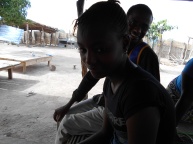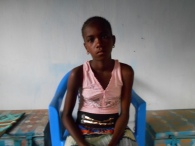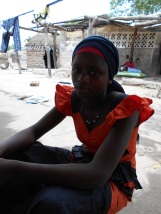“‘It’s been too long,’ she whispers behind them. ‘Why do we do that to ourselves? Why do we stay away so long from the places that make us whole?'”
I had a moment the other day. As I was doing interviews with the girls from the scholarship program I discussed in my last post, I was interacting with different people and going into compounds that I don’t usually go in to. The English teacher from the local middle school, Madame Diatta, came along to help me find the girls’ houses and to help me explain anything if there was confusion. As we were sitting with parents and greeting/talking before the interview, Madame Diatta would usually make sure the parents were familiar with Peace Corps and what I was doing there. At one house, we were sitting with the girl’s father and Madame Diatta asked him if he knew about Peace Corps. He was familiar with it, and started thanking me:
“It’s not easy to leave behind everything and come to a new place. But you came here, you live with a family, with the people. You learn the language and the culture. If everyone did what you are doing and made an effort to understand other people, there would be no war and only peace in the world”
I was so touched by his words. As you’ve probably been able to glean if you read my posts regularly, life in the Peace Corps is a roller coaster. There’s good days, bad days, highs, lows. Life here can seem impossibly difficult at times and laid back and totally manageable at others. It’s not often that I receive this type of praise from people, and it definitely made it one of those ‘it’s all worth it’ moments. Even though I don’t think I quite deserve the credit this man was giving me, it is nice to feel such appreciation and recognition.
I myself have some pretty big questions about what we/I am doing here as a Peace Corps volunteer. Peace Corps is ostensibly a sustainable development organization. But how capable are we of doing real development work and how sustainable is it? These questions, like most questions I have found myself asking in Senegal, have no easy answers.
Every six months, there’s a turnover of volunteers — a new stage (sometimes it’s easier to use French words) comes in to replace the volunteers that are completing their service. Since I’ve been here for about 16 months now, I’ve witnessed three of these transitions. I’ve seen the goodbyes and the hellos. One thing that has struck me is that Senegalese people overwhelmingly think that two years is too short. When my site-mate (the other volunteer who lives in the same town as me) came to say her final goodbyes to my host family, my host mom expressed this. She lamented that as soon as we get really integrated, as soon as we really learn the language, as soon as we all get used to and understand each other — the two years are up. Its time for us to go home — only to be replaced by a new volunteer that has very limited lingual and cultural knowledge.
This is the nature of Peace Corps Senegal and perhaps Peace Corps in general. Two years away from home seems like a long time for us as Americans. Most of us have big plans for grad school, starting our careers, maybe even starting families. Two years is a long time to be away from all of that. But it’s not very long here when you’re considering the long process of language learning and cultural integration. With the slow pace of life and work in Senegal, it’s hard to get much done in two years, especially when the first year or so is spent learning language and getting comfortable in your community.
This is a fairly easy thing to explain away to Senegalese people. When people in my community start asking me if I’ll stay an extra year, if I really need to go home next year, I tell them that my mom would miss me too much if I didn’t go home. I haven’t met anyone yet who hasn’t accepted that as a legitimate reason.
But just because they understand doesn’t necessarily make it easier. I was hanging out with my friend Thiane the other day, whose family has had several volunteers. They don’t currently have one, because their last volunteer left early after struggling with the death of her host father (Thiane’s father). I was asking her if she wanted another volunteer in her family. She told me that she likes having volunteers, but she also doesn’t like it. “I like hanging out with them and getting to know them, but in the end they always leave. When I think about you leaving someday it makes my heart sad. Sometimes I think it might be easier to not get to know someone that will just leave after two years.”
I can’t blame her for that. While I have a stock response that will get Senegalese people off my back, it’s hard for me to explain this away on a deeper level. When I was living in San Diego and working at farmer’s markets a couple of years ago, I had this one customer who would often sit and chat with me a while at my stand. She was involved in social justice activism on several levels in the community. She had traveled extensively, but not in recent years. She had come to the conclusion that if you really want to make a difference, if you really want to change things, you have to choose a place and stay put. You have to be a well-rooted member of a community with long term investment in the future of that community if you want to effect meaningful change.
This idea really stuck with me. The transient nature of my as well as my fellow Millenials’ lives is something I struggle with. I grew up one place, went to college another place, lived another couple of places after that, and now am living here in Senegal. In all of these places I’ve built lives and relationships — only to leave them behind after a couple of years. Keeping in touch is hard, and while I’m grateful for the opportunity to have lived and known different places, I can’t help but feel stretched. How do I make sense of all of these different lives I’ve lead? How do I not forget the lessons I’ve learned and the relationships I’ve forged? And where do I go from here?
Again, no easy answers. A question that I get all the time here is, when I go home to the States, will I come back? I tell people that yes, I would like to come back. If I have a job and make enough money. It’s hard for people to understand why the majority of volunteers never come back. After spending so much time here and building such strong connections, how could one leave and never return? Or, even worse, not even pick up the phone and call?
I can see how it happens though. I think it’s pretty easy to get swept back up into American life, and pretty difficult to remember everything else. Its something I talk about a lot with my fellow volunteers. We feel as if we’ve learned so much here, but are afraid that it might be lost once we go home. For example, I’ve become an infinitely more patient person here. Sometimes I’ll wait hours for something — a car to fill up, a person to meet with me, the electricity to come back, you name it — and it doesn’t really bother me. But when I return to the land of reliability and people having real expectations about things happening at certain times… Will I be able to hold on to this perspective that I have?
I can’t help but feel slightly jealous of my Senegalese friends and family. Most of them were born in this town, grew up here, and will stay here for the rest of their lives. They know everyone and together they form a tight-knit community. It’s a simple life where almost everyone you’ve ever known or been close to is probably no more than a five minute walk away. This is something that I will never have. While I am beyond grateful for the fortunate life circumstances and opportunities I’ve had and wouldn’t trade it for anything — it would still be nice to have everyone I love in one place.
But since that’s not possible, I’ll just have to hold them all in my suitcase heart. And try my best to remember all the people and places I’ve been, and the lessons I’ve learned along the way.

























